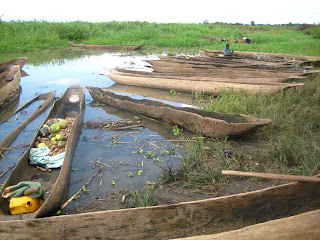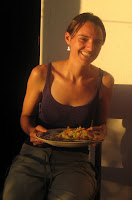
Christmas has not been evident at all here. There hasn't really been anything to hint that Christmas is coming and it was a bit of a shock when we travelled through Blantyre last week and the supermarket was full of tinsel and funked up Christmas songs! Ellie sent me a lovely advent calendar with stained glass windows and that’s currently our token Christmas decoration! I was going to post this this morning but the electricity was off and then the internet stopped working all day so in the mean time I've been to the market and we found some decorations for sale so there is a little sign of Christmas after all - see pic (and note that the banner says Happy Birthday!) The picture of me is the paper christmas tree I made this morning with the presents mum gave me to bring out "underneath" it and a couple of pressies between Rebecca and I.
We’ve been listening to Christmas songs and carols this morning. Have you ever listen
 ed properly to the words of BandAid’s song: “There won’t be snow in Africa this Christmas”? Well, that’s true but the whole continent is not “a world of dread and fear, where the only water flowing is the bitter sting of tears.” I suppose we can forgive Bob Geldof for the slightly extreme lyrics given their time of writing during the 1984 famine in Ethiopa. Unfortunately things haven’t changed much and there are many problems with drought and famine particularly in East Africa this year, but if we’re going to focus on the sad state of the world at Christmas I prefer the lyrics to Delirious?’ song which instead of telling us to “thank God it’s them instead of you” they sing “Forgive us all, forgive us please, As we fight for this broken world on our knees.” It’s not a Christmas song but it speaks more to me about the true meaning of Christmas in the “freedom we have …in a man nailed to a tree”. It’s definitely easier in Lichinga to imagine the night that Jesus was born on, with everything carrying on as normal around the stable and most of the world oblivious to what was happening. It’s also a good time for me to reflect on one of the things that drives me to be here in the first place. When Jesus was on the earth he spent the majority of His time with the poor, eating with them, helping them and loving them and the bible talks about being parts of Christ’s body on earth today (1Cor12). For me, personally, my faith is not just about praying for the poor, it’s about trying to do the very small amount I can do, about it.
ed properly to the words of BandAid’s song: “There won’t be snow in Africa this Christmas”? Well, that’s true but the whole continent is not “a world of dread and fear, where the only water flowing is the bitter sting of tears.” I suppose we can forgive Bob Geldof for the slightly extreme lyrics given their time of writing during the 1984 famine in Ethiopa. Unfortunately things haven’t changed much and there are many problems with drought and famine particularly in East Africa this year, but if we’re going to focus on the sad state of the world at Christmas I prefer the lyrics to Delirious?’ song which instead of telling us to “thank God it’s them instead of you” they sing “Forgive us all, forgive us please, As we fight for this broken world on our knees.” It’s not a Christmas song but it speaks more to me about the true meaning of Christmas in the “freedom we have …in a man nailed to a tree”. It’s definitely easier in Lichinga to imagine the night that Jesus was born on, with everything carrying on as normal around the stable and most of the world oblivious to what was happening. It’s also a good time for me to reflect on one of the things that drives me to be here in the first place. When Jesus was on the earth he spent the majority of His time with the poor, eating with them, helping them and loving them and the bible talks about being parts of Christ’s body on earth today (1Cor12). For me, personally, my faith is not just about praying for the poor, it’s about trying to do the very small amount I can do, about it. "Then the righteous will answer him, 'Lord, when did we see you hungry and feed you, or thirsty and give you something to drink? When did we see you a stranger and invite you in, or needing clothes and clothe you? When did we see you sick or in prison and go to visit you?'
"The King will reply, 'I tell you the truth, whatever you did for one of the least of these brothers of mine, you did for me.'
(Matthew 25: 34-40)
Anyway, back to the original sentiment of this post. I hope that you all have a blessed and restful Christmas with friends and family. Eat lots and sing lots and as one version of We Wish You a Merry Christmas goes:




.jpg)
.jpg)
.jpg)

